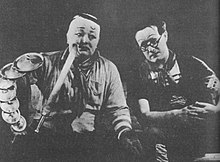Osvobozené divadlo
Osvobozené divadlo ( The Liberated Theater ) was a Czech avant-garde Prague theater set, founded in 1926 by the Devětsil poets' association . The name was given by Jiří Frejka based on the term "unleashed theater" of the Russian avant-garde . However, the roots of the origins go back to 1923. The theater was heavily influenced by Dadaism and Futurism, and later poetism . The conception of the modern scene has also prevailed , with the effort to involve the viewer in the action.
Works by Guillaume Apollinaire , Alfred Jarry , Jean Cocteau , André Breton , Filippo Tommaso Marinetti and Vítězslav Nezval were performed .
history
The first performance was on February 8, 1926 with the premiere of Molière's George Dandin . The play was not understood by critics and so only a few spectators visited the theater at the beginning. In 1927 the theater moved to the Umělecká beseda building in Lesser Town in Prague . The actors Jan Werich and Jiří Voskovec also appeared here for the first time in the play Vest pocket revue . The play, staged by both, was initially conceived only for a close circle of friends, but was performed in the new scene because of its great success. In the same year Jaroslav Ježek performed with his piano improvisations . At the end of the year, Frejka and Emil František Burian left the project after internal disputes and founded the Da-Da theater .
From this point on, the theater can be equated with the work of the comedian duo Voskovec and Werich, for whom Ježek wrote music influenced by jazz. Another important artist who joined was the director Jindřich Honzl, who staged all the pieces and at the same time worked as a theoretician of avant-garde theater.
From 1932, entertainment and satire, as well as tips against the social life of that time, dominated the stage. The success was largely due to the fact that the theater people only created a supporting program and the rest developed based on the reactions from the audience.
Voskovec and Werich also introduced the so-called Forbín . The term is derived from the German "Vorbühne" and came about when there was a disturbance on the stage where both actors had to entertain the audience. These are improvised dialogues, a reaction to current political and cultural events. Because they weren't prepared, the dialogues differed at each performance. Werich continued the tradition of the Forbíns after the war in the ABC theater, however, with less success with Miroslav Horníček .
In the same year the first political drama was staged. The play Caesar warned of the dangers of fascism , increasingly criticized society and ultimately led to the Liberated Theater being viewed as a political stage. The Donkey and Shadow (Osel a stín) performed in the following year also dealt with the dangers of fascism and represented leftist views, in part it propagated socialist ideas.
In 1934 The Executioner and the Fool (Kat a blázen) was premiered, a play that had great difficulties with the censorship due to the open and sharp criticism of events in Hitler's Germany . In 1935 the German embassy complained about insulting the head of state. The theater was faced with the decision to weaken its criticism or to accept the termination of the rooms in the building of the artists' association. After further complaints and arguments, Osvobozené divadlo had to leave the U Nováků building in Vodičková ulice.
The theater was called the Tied Up Theater (Spoutané divadlo) and was located near the Rococo Theater on Wenceslas Square . Here also the most successful pieces of the duo Voskovec and Werich appear rags ballad (Balada z Hadrů), heads and tails (Rub a líc) and the heavy Barbara (Těžká Barbora).
In 1936 Spoutané divadlo returned to the old building and renamed itself the Liberated Theater. The other anti-fascist plays, World Behind Bars (Svět za mřížemi) and Fist on the Eye (Pěst na oko) ultimately lead to the ban on the stage. In 1938 the theater was finally closed. Voskovec, of Jewish origin, is accused of disrupting international relations with Germany. He emigrates to the USA with Werich and Ježek .
After the Second World War, Voskovec and Werich tried to bring the theater back to life. In the meantime, however, the situation has changed. If both wanted to take the socially critical path they had chosen, they would have had to criticize the new situation in their own country. During the redesign, there were soon differences between the authors and the further direction of the theater. After Voskovec emigrated again, the theater completely disappeared from Czech cultural life.
Importance of the theater
Osvobozené Divadlo was a constant cultural force in the interwar period of the Czechoslovak Republic . Many important actors began their careers here. In addition, many experimental pieces were performed that had no place on traditional stages.
Great personalities
Contributors
- Jan Werich
- Jiří Voskovec
- Jaroslav Ježek
- Jindřich Honzl
- Jiří Frejka
- František Filipovský
- Vladimír Šmeral
- Bohuš Záhorský
- Blanka Waleská
- Miloš Nedbal
- Zdeněk Štěpánek
- Jan Pivec
- Emil František Burian
- Jiřina Štěpničková
